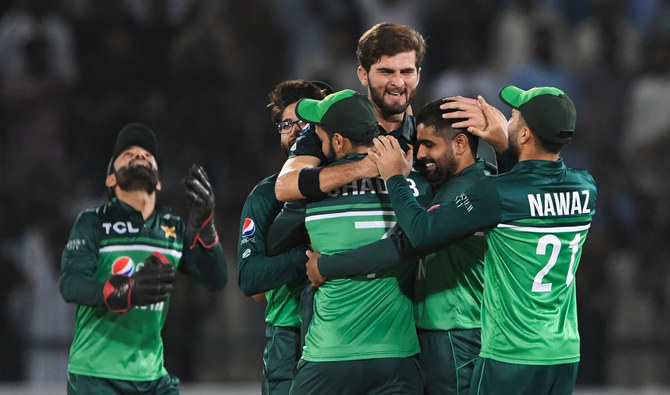ISLAMABAD: Former champions Pakistan are counting on fit-again pace spearhead Shaheen Shah Afridi to be back to his destructive best at the Twenty20 World Cup in Australia.
The 22-year-old was on Tuesday given the green light to join the squad after recovering from a right knee injury sustained in the first Test against Sri Lanka in July.
He missed the Asia Cup, the Twenty20 series against England and this week’s tri-series in New Zealand.
The tall left-arm fast bowler has completed an intensive period of rehab in London and will travel to Australia, where he has two warm-up games in Brisbane next week to regain his rhythm, the first against England on Monday.
Pakistan will have a final warm-up against Afghanistan next Wednesday to prepare for their blockbusting opening match against India at the cavernous Melbourne Cricket Ground on October 23, which is expected to draw 90,000 spectators.
Shaheen destroyed India’s top order in the T20 World Cup in Dubai last year, dismissing Rohit Sharma, KL Rahul and Virat Kohli, returning figures of 3-31 as Pakistan romped to a 10-wicket victory.
Pakistan’s maiden World Cup win against India set up the team’s march to the semifinal, where they lost to eventual champions Australia.
“He has recovered well and we are confident that he will be at his best come the India game,” captain Babar Azam told AFP.
“We have a very good fast bowling attack which Shaheen leads.”
Top-order batsman Fakhar Zaman, who scored 55 not out against Australia in last year’s semifinal, is also on the road to recovery after a knee injury.
“Zaman, who is one of the three traveling reserves for the T20 World Cup, will travel to Brisbane with Shaheen and will complete his rehabilitation,” the country’s cricket board said Tuesday.
Since last year’s World Cup, Pakistan have swept to 3-0 T20 series wins against Bangladesh and the West Indies, lost to Australia again in a lone T20 in Lahore and reached the final of the Asia Cup in the UAE where they lost to Sri Lanka.
England edged them 4-3 in a home series. Pakistan won their first two games in the current tri-series against Bangladesh and New Zealand before losing the third to the Black Caps on Tuesday.
“Our team has done well, so I am optimistic about our chances in the World Cup,” said Azam, whose team faces India, Bangladesh, South Africa and two qualifiers in Group 2 with the top two progressing to the semifinals.
Pakistan have a potent and varied bowling attack, with fast-improving Haris Rauf, Naseem Shah and Mohammad Hasnain supplementing Shaheen.
Leg-spinner Shadab Khan leads the spin quartet alongside left-armer Mohammad Nawaz, off-spinner Iftikhar Ahmed and leg-spinner Usman Qadir.
Pakistan’s middle order batting has been their achilles heel despite the presence of the prolific Azam and Mohammad Rizwan at the top of the order.
The pair set a world record for the highest chase without losing a wicket when they posted 203 to beat England in Karachi last month with Azam making an unbeaten 110 and Rizwan 88 not out, their second double-century opening stand in T20s.
But if the pair fall early then the team’s batting fragility can be exposed.
“Apart from the positives, we had some concerns and I think our middle-order needs to step up,” admits Azam, who has seen Iftikhar, Shan Masood, Khushdil Shah, Haider Ali and Asif Ali all given chances but failing to make any consistent impact.
“We have tested our bench strength by sending different combinations in batting and bowling. We are working on our fielding too.”












